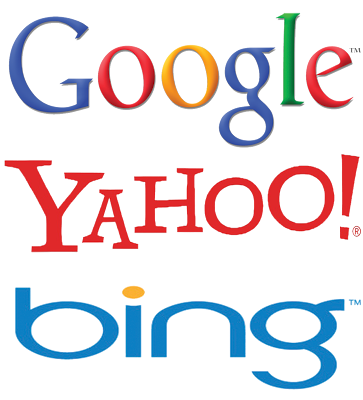Top 100 search engines in your favorites lists
The Top 100 is listed at the end of the analysis.
Ask anyone which search engine they use to find information on the Internet and they will almost certainly reply: "Google." Look a little further, and market research shows that people actually use four main search engines for 99.99% of their searches: Google, Yahoo!, MSN, and Ask.com (in that order). But in my travels as a Search Engine Optimizer (SEO), I have discovered that in that .01% lies a vast multitude of the most innovative and creative search engines you have never seen. So many, in fact, that I have had to limit my list of the very best ones to a mere 100.
But it's not just the sheer number of them that makes them worthy of attention; each one of these search engines has that standard "About Us" link at the bottom of the homepage. I call it the "why we're better than Google" page. And after reading dozens and dozens of these pages, I have come to the conclusion that, taken as a whole, they are right!
The Search Homepage
In order to address their claims systematically, it helps to group them into categories and then compare them to their Google counterparts. For example, let's look at the first thing that almost everyone sees when they go to search the Internet - the ubiquitous Google homepage. That famously sparse, clean sheet of paper with the colorful Google logo is the most popular Web page in the entire World Wide Web. For millions and millions of Internet users, that Spartan white page IS the Internet.
Google has successfully made their site the front door through which everyone passes in order to access the Internet. But staring at an almost blank sheet of paper has become, well, boring. Take Ms. Dewey for example. While some may object to her sultry demeanor, it's pretty hard to deny that interfacing with her is far more visually appealing than with an inert white screen.
A second example comes from Simply Google. Instead of squeezing through the keyhole in order to reach Google's 37 search options, Simply Google places all of those choices and many, many more all on the very first page; neatly arranged in columns.
Artificial Intelligence
A second arena is sometimes referred to as Natural Language Processing (NLP), or Artificial Intelligence (AI). It is the desire we all have of wanting to ask a search engine questions in everyday sentences, and receive a human-like answer (remember "Good Morning, HAL"?). Many of us remember Ask Jeeves, the famous butler, which was an early attempt in this direction - that unfortunately failed.
Google's approach, Google Answers, was to enlist a cadre of "experts. " The concept was that you would pose a question to one of these experts, negotiate a price for an answer, and then pay up when it was found and delivered. It was such a failure, Google had to cancel the whole program. Enter ChaCha. With ChaCha, you can pose any question that you wish, click on the "Search With Guide" button, and a ChaCha Guide appears in a Chat box and dialogues with you until you find what you are looking for. There's no time limit, and no fee.
Clustering Engines
Perhaps Google's most glaring and egregious shortcoming is their insistence on displaying the outcome of a search in an impossibly long, one-dimensional list of results. We all intuitively know that the World Wide Web is just that, a three dimensional (or "3-D") web of interconnected Web pages. Several search engines, known as clustering engines, routinely present their search results on a two-dimensional map that one can navigate through in search of the best answer. Search engines like KartOO and Quintura are excellent examples.
Recommendation Search Engines
Another promising category is the recommendation search engines. While Google essentially helps you to find what you already know (you just can't find it), recommendation engines show you a whole world of things that you didn't even know existed. Check out What to Rent, Music Map, or the stunning Live Plasma display. When you input a favorite movie, book, or artist, they recommend to you a world of titles or similar artists that you may never have heard of, but would most likely enjoy.
Metasearch Engines
Next we come to the metasearch engines. When you perform a search on Google, the results that you get are all from, well, Google! But metasearch engines have been around for years. They allow you to search not only Google, but a variety of other search engines too - in one fell swoop. There are many search engines that can do this, Dogpile, for instance, searches all of the "big four" mentioned above (Google, Yahoo!, MSN, and Ask) simultaneously. You could also try Zuula or PlanetSearch - which plows through 16 search engines at a time for you. A very interesting site to watch is GoshMe. Instead of searching an incredible number of Web pages, like conventional search engines, GoshMe searches for search engines (or databases) that each tap into an incredible number of Web pages. As I perceive it, GoshMe is a meta-metasearch engine (still in Beta)!
Other Alt Search Engines
Finally, almost prophetically, Google is silent. Silent! At least Speeglebot talks to you, and Nayio listens! But of course, why should Google worry about these upstarts (all 100 of them)? Aren't they just like flies buzzing around an elephant? Can't Google just ignore them, as their share of the search market continues to creep upwards towards 100%, or perhaps just buy them? Perhaps.
 |
| SEARCH ENGINE VS SOCIAL MEDIA |
The Last Question
Issac Asimov, the preeminent science fiction writer of our time, once said that his favorite story, by far, was The Last Question. The question, for those who have not read it, is "Can Entropy Be Reversed?" That is, can the ultimate running down of all things, the burning out of all stars (or their collapse) be stopped - or is it hopelessly inevitable?
The question for this age, I submit, is,"Can Google Be Defeated"? Or is Google's mission "to organize the world's information and make it universally accessible and useful" a fait accompli?
Perhaps the place to start is by reading (or re-reading) Asimov's "The Last Question." I won't give it away, but it does suggest The Answer.











.jpg)






